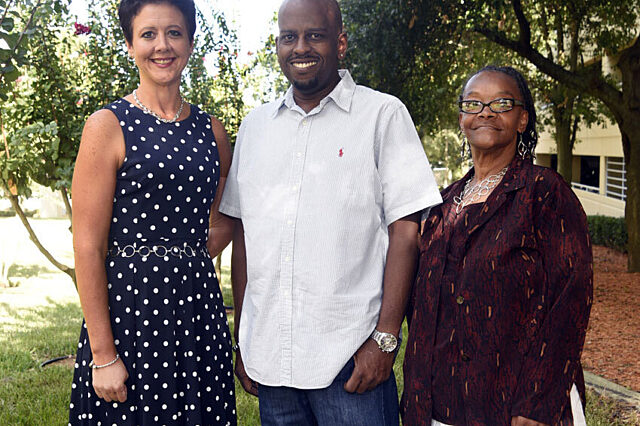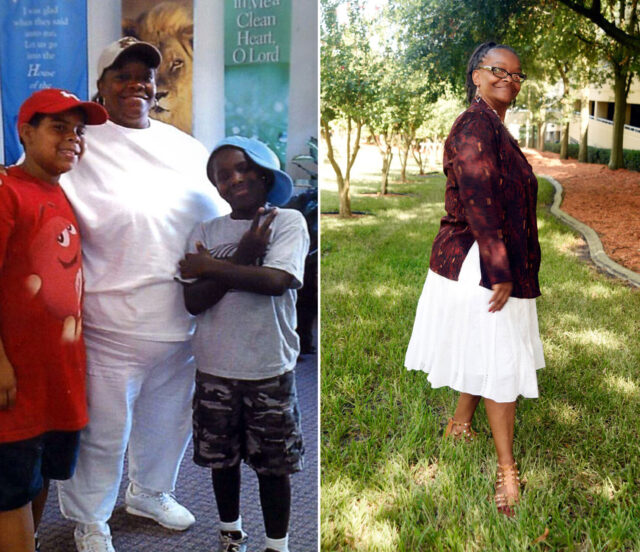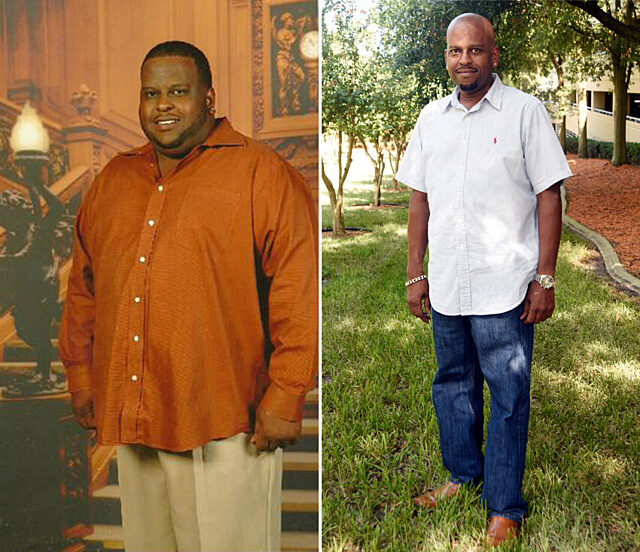Patients experience “a whole new world” after weight loss surgery

Shannon Little, Keflyn Rice and Darryl Marbry each lost more than 100 lbs. within a year of weight loss surgery.
Imagine waiting in line for hours to take your kids on a theme park ride, only to be kicked off because you’re too heavy.
Imagine being turned away at a restaurant because there isn’t a booth you can fit into.
Imagine finding out your family has been going to the beach without you because your weight makes you too hot to stay for more than a few minutes, and you are too slow to keep up with your family.
That was what life was like for Shannon Little, Darryl Marbry and Keflyn Rice before they had bariatric surgery to finally rid them of their years of struggling with obesity. After they made the tough decision to undergo surgery – and did the work it takes before and after surgery to achieve a healthier lifestyle – life has drastically changed for all three of them.
Shannon recently completed her first marathon. Keflyn is back to riding roller coasters. And Darryl is relishing the little things in life she couldn’t do before: going to the movies, shopping for clothes in any store she wants, and – yes – walking the beach at a pace her family can barely keep up with.
Why bariatric surgery?
Obesity has many causes, including genetics, psychological issues, metabolism problems, poor eating habits, a sedentary lifestyle or a combination of factors. It is linked directly or indirectly to almost every serious health condition: heart disease, diabetes, high blood pressure, high cholesterol, cancer, sleep apnea, joint pain, depression and more.
“The good news is bariatric surgery can improve many of these conditions, including diabetes. For some patients, within 48 hours after their surgery, they don’t need medication anymore,” said fellowship-trained bariatric surgeon Bestoun Ahmed, MD, an assistant professor at the University of Florida College of Medicine –Jacksonville.
More than half of the United States population – 66 percent – is overweight. An estimated 24 million adults are morbidly obese. Losing weight through diet and exercise is the best option for those who are able. But when that fails, bariatric surgery can be a life-saving option that changes the size of the stomach and the way the body responds to food, helping the patient quickly lose the excess weight.
“Among severely obese patients, bariatric surgery is the most effective approach for long-term weight loss,” Ahmed said.
In order to qualify for bariatric surgery, a patient must be more than 100 pounds over his or her ideal body weight and have either a Body Mass Index (BMI) over 40 or a BMI over 35 that is paired with a comorbidity, such as the health conditions listed above. The person cannot be a smoker or drug user and also has to have his or her thyroid checked.
Qualifying for surgery is just the beginning. Potential patients have to go through a rigorous process of education and preparation before they ever go to the operating room. There is an introductory seminar led by the surgeon, nutrition consultations, a psychological evaluation and a fitness program. In fact, in order to have a successful surgery, patients are required to first lose a percentage of their body weight (with medical supervision), which will shrink the liver and make the surgery safer.
“There’s a stigma that opting for surgery is the easy way out,” said Shannon, a UF Health nurse manager who weighed 320 at her heaviest. “In reality, it is the most difficult choice, because everything about your life has to change. It’s not a magic bullet.”
The choices
UF Health Jacksonville offers all major types of bariatric surgery, including gastric bypass, gastric banding, sleeve gastrectomy and BilioPancreatic Diversion With Duodenal Switch. Each method is described under the “services” section on the department’s website, ufhealthjax.org/bariatric-surgery. In the introductory seminar offered to potential patients, the staff discusses the pros and cons of each type of surgery at length. They show images and videos of how each surgery will change the stomach. Patients will later work with their surgeon to choose the best option for them.
Keflyn had rapidly gained weight after retiring from the Navy in 2010, topping out at 333 lbs. He was so large, he couldn’t bend over to tie his shoes. If he dropped something on the floor, he couldn’t pick it up. He began the process to pursue weight loss surgery, but almost backed out. Then he ran into a friend in the grocery store:
“I saw my friend’s wife, and I thought she was with a new guy. But it was him – he had had the same surgery I was considering with the same doctor at UF Health,” he said.
Keflyn, who had never had surgery in his life, was convinced. He set out to do his part of the work immediately, exercising and watching his diet. He lost 28 lbs. as he prepared for gastric bypass.
Surgery Time
UF Health Jacksonville has a dedicated hospital unit for bariatric surgery patients, with beds and showers built to accommodate any person’s size. The patient rooms are also designed so a family member can stay with the patient.
“We encourage families to be a part of every step: to stay in the hospital, come to the educational classes and attend the support group meetings,” said bariatric program coordinator Carol Abbott. “Families can inadvertently sabotage a patient’s weight loss, so it’s important for them to be involved.”
Surgery lasts about an hour, and within four to six hours after waking up, patients will be getting up and walking in their rooms. They head home within two to three days.
Darryl, who was 370 lbs. at her heaviest, had once contemplated suicide because of her weight. She had breathing problems and chest pains, could barely walk, and blacked out at times. But Abbott had her up and walking after her surgery, and she’s been walking ever since – plus she takes the stairs. It’s a lifestyle change she celebrates every day.
“I used to cry all the time. The only walking I ever did was from the bed to the bathroom and back,” she said. After an abusive relationship, food was her solace, along with drugs, drinking and smoking. Darryl gave all of those vices up when she decided to have the surgery. She said her grandchildren, including a middle-schooler named Percy, motivated her to make the change.
“Percy was a very good inspiration to me, he kept me going,” she said. “He was even more determined for me to lose weight than I was, because he had things for us to do. We walk and we play, and I am able to keep up with my grandkids now.”
Darryl’s view of herself on the inside has undergone a transformation, too.
“This inspired me. Now, I love me,” she said.
Abbott said the strength to go through such drastic changes has to come from within.
“We’re just a small piece in their success,” she said of the hospital’s bariatric patients. “We give them a tool, the surgery, but they are the ones who have to do all the work.”



Life After Surgery
Once a patient recovers from surgery, the work to maintain a healthy weight is not done: it’s just begun. At first, a liquid diet is necessary. Vitamins are a must. As the body adjusts, a healthy diet of nutritious foods and lots of water will be best. It is possible for patients to gain back their weight if they do not commit to the healthier eating and daily physical activity.
Shannon spent decades suffering the ups and downs of attempting to lose weight and then gaining even more back. She spent four years just trying to decide whether to have the surgery. But it took her less than a year to drop 100 lbs. once she underwent gastric bypass. Altogether, she has lost more than 160 lbs.
She committed to a fitness routine and eating habits that would ensure she stayed that way.
“It doesn’t mean I don’t ever have a day where I want a cupcake, and it doesn’t mean I don’t have the cupcake. But if I do, I’ll go for a run to make up for it,” she said.
The reward for the hard work? No longer having to live with all the modifications she made to her life because of her weight.
“It’s amazing, the difference when you can slide into a booth at a restaurant or wrap a towel around yourself,” she said. “Most of all, being able to participate in life with my kids was a huge factor for me.”
On family vacations, Shannon used to hide out in a camper, embarrassed because she was too heavy to ride in the family’s boat and didn’t want to be seen in her bathing suit. This year, she was in on all of the excitement and caught her first lobster.
The work to stay fit has become something she looks forward to rather than just tolerates. She discovered a love for running, and began participating in races to help hold herself accountable to her fitness routine. In 2014, she completed her first marathon, the 26.2 with Donna.
“My whole world changed,” Shannon said. “The social structure changed. It didn’t revolve around going out to eat anymore.”
Keflyn said he’s had a lot of “wow” moments since losing his weight.
“Just being able to cross my leg over my other knee was a wow moment,” he said.
Keflyn said he also follows a workout regimen and healthy diet to ensure he keeps his weight in check.
“They say that surgery adds 10 years to your life, so I’m making sure I cash in on every one of those years,” he said.
To find out more about the bariatric surgery program, visit ufhealthjax.org/bariatric-surgery or call 904-383-1023 to find out when the next free informational seminar will be held.